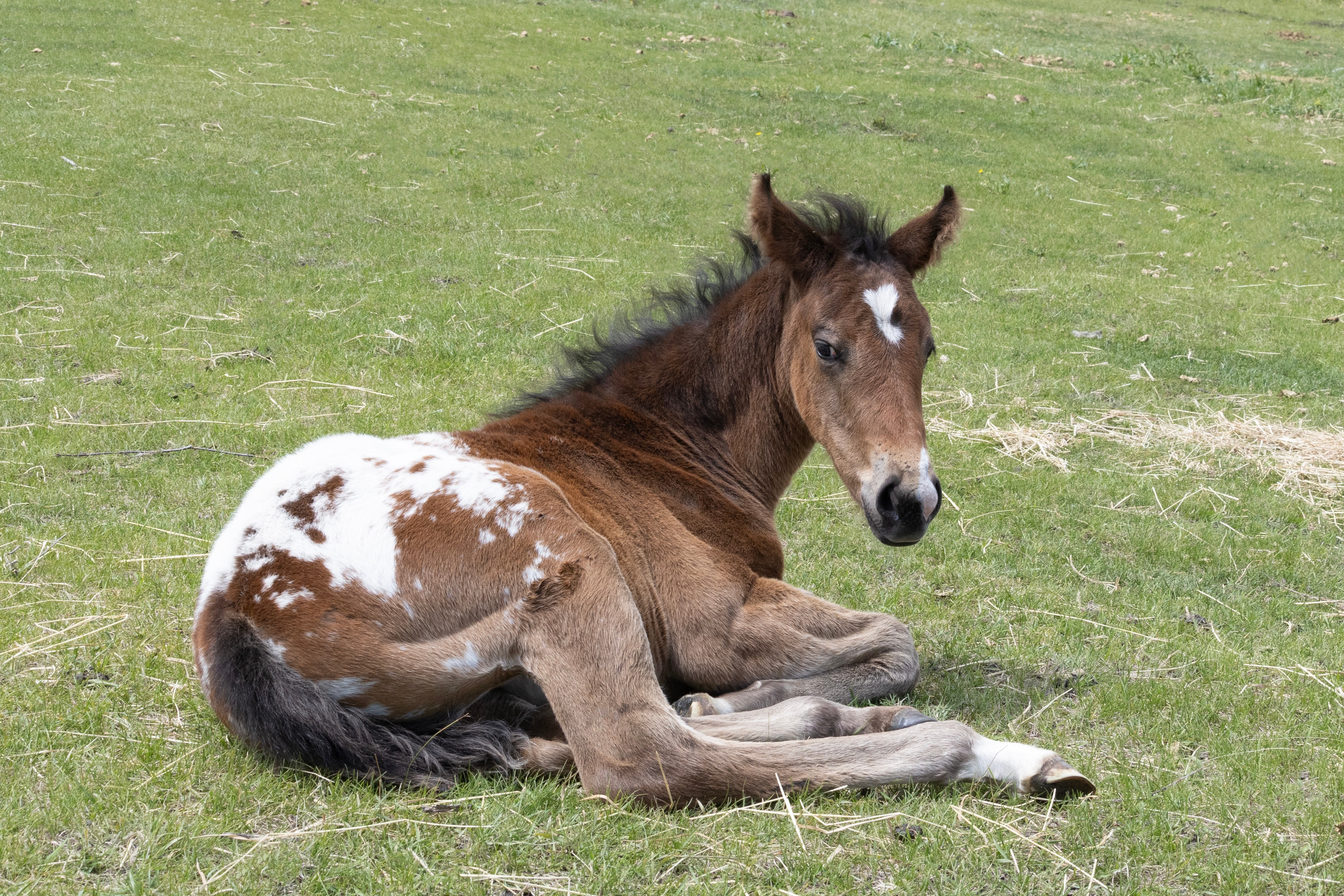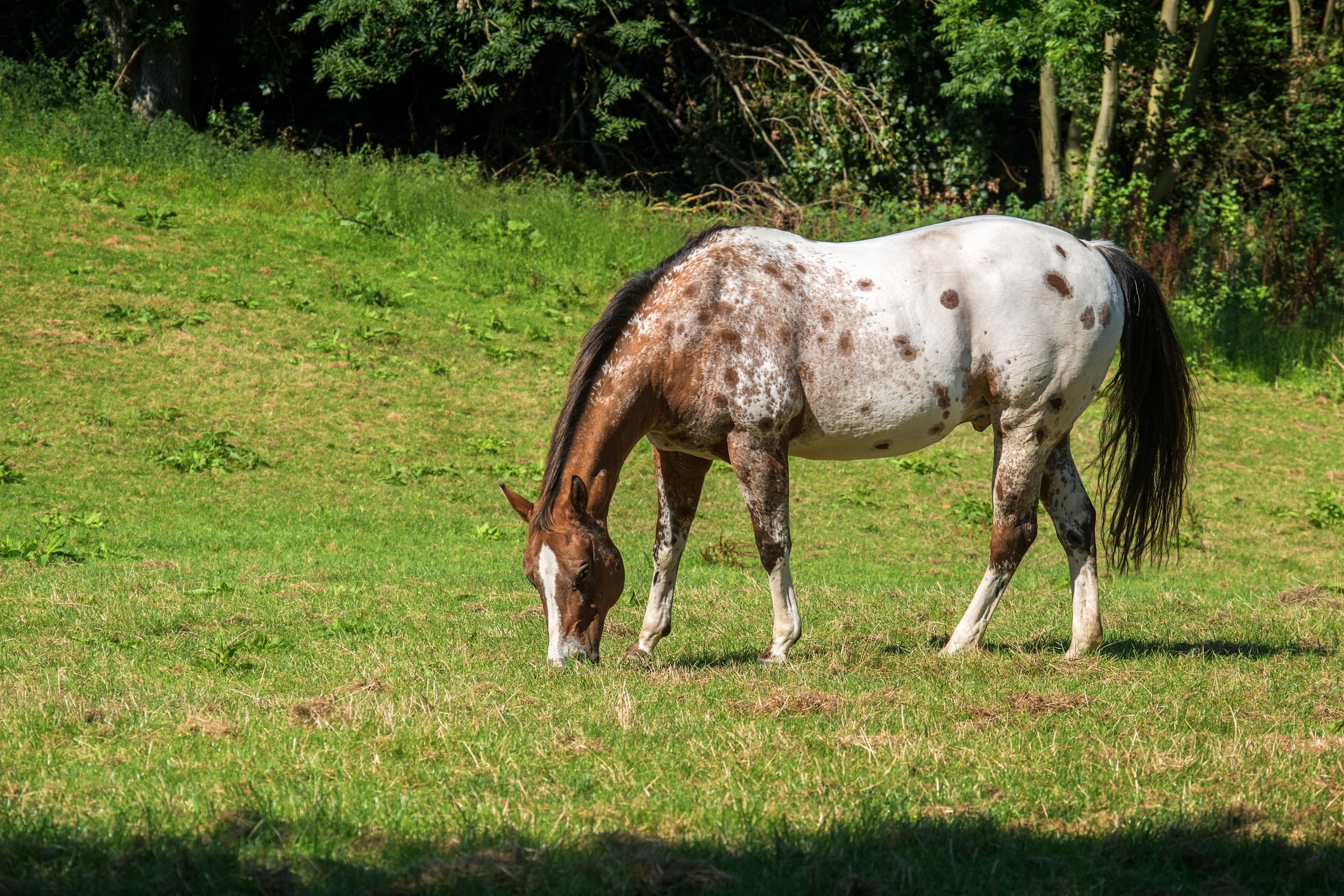Appaloosa
Anna-av/iStock / Getty Images Plus via Getty Images
The Appaloosa horse was developed in the United States by the Nez Perce Indigenous people. Formerly called the Palouse horse, this striking equine breed is known for its beautiful coat patterns, especially the spotted pattern. Beyond their good looks, Appaloosa horses make great companions because of their charming personality.
The Appaloosa Horse Club is an organization committed to preserving and sharing the Appaloosa horse with this interested in this colorful breed.
Appaloosa Snapshot
-
Height: 14.2 to 16 hands (56.8 to 64 inches)
-
Weight: 950 to 1,200 pounds
-
Lifespan: 30 years
-
Coat Patterns: blanket, spots, blanket with spots, roan, roan blanket, roan blanket with spots, solid
Caring for an Appaloosa
The Appaloosa is a popular breed for a variety of reasons. These horses enjoy working and have the strength and stamina to excel in a variety of disciplines, so they’re equally great for riders who compete and for those who simply want a horse for riding on quiet, relaxing trails.
Appaloosas are also beloved for their friendly and gentle disposition. They are appropriate for all levels of riders, including young riders and beginner equestrians. In terms of their daily care and grooming requirements, Appaloosa horses don’t have complicated needs.

Appaloosa Health Issues
Although the Appaloosa is considered a generally healthy and strong breed, these horses can be prone to some health issues. An individual horse’s genes and bloodline can make them more susceptible to certain conditions.
The health problems that Appaloosas can develop include:
Congenital Stationary Night Blindness (CSNB)
Also known as CSNB, congenital stationary night blindness makes it hard for a horse to see in no-light or low-light conditions, such as during the night, dawn, and dusk. It only lessens a horse’s night vision; they are able to see normally during the day.
CSNB is a genetic condition that affects Appaloosas that have two copies of a pattern mutation called leopard complex spotting (LP), also known as Appaloosa spotting. The good news is that the condition will not get progressively worse over time.
Horses born with two copies of LP are also at an elevated risk of ERU (see below).
Symptoms of congenital stationary night blindness will be apparent when the leopard Appaloosa horse is in a dimly lit area, and include:
-
Reluctance to move
-
Anxiety
-
Confusion
-
Bumping into things
There is no cure for CSNB, but a veterinarian can diagnose this condition and provide tips on how to care for your horse. For example, keeping your horse’s stall lit enough for them to see well during the night can reduce their fear.
Equine Recurrent Uveitis (ERU)
Another condition that can affect an Appaloosa horse’s eyes is equine recurrent uveitis (ERU), which is also called moon blindness. This is a chronic form of uveitis, and it’s the most common cause of blindness in horses.
Compared to other breeds, Appaloosas are eight times more likely to have this type of uveitis and they frequently have the persistent form of the disease. Appaloosas are also four times more likely to develop blindness than other horse breeds.
ERU causes inflammation of the uveal tract of the eye, which is the middle layer of the eye wall including the iris. A horse can have multiple severe attacks and also experience a lengthy period of time in between them.
ERU causes symptoms that include:
-
Light sensitivity
-
Redness
-
Excessive tear production
-
Eyelid twitching
-
Eye pain
If you notice any abnormalities with your horse’s eye, call your vet immediately—eye conditions are always considered an emergency.
Topical eye medications used to treat ERU may include:
-
Corticosteroids (prednisone, dexamethasone)
-
Non-steroidal anti-inflammatory medications (NSAIDS) (flurbiprofen, diclofenac)
-
Atropine
-
Cyclosporine implant
If the condition is very severe, enucleation (removal of the eye) may be recommended.
Hyperkalemic Periodic Paralysis
If an Appaloosa has the Quarter Horse breed in their bloodline, they may be more susceptible to hyperkalemic periodic paralysis (HYPP), a genetic condition that causes high potassium levels, called hyperkalemia.
HYPP Is a genetic condition that has a mutation involving the function of the sodium channels in the muscle cells and the ability to regulate potassium in the blood. This can lead to uncontrolled muscle spasms and trembling.
HYPP symptoms include:
-
Trembling
-
Muscle twitching
-
Weakness
-
Pain
-
Sweating
-
Stiffness
-
Rapid heart rate and breathing
-
Paralysis
-
Collapse
HYPP is not curable, but it can be managed and treated with your veterinarian’s guidance.
A horse with HYPP should be fed a diet limiting the amount of potassium. Cool-season grass hays and grains are typically low in potassium, as well as pastureland.
Regular exercise or turnout can be beneficial for horses with HYPP.
During an HYPP episode, administering glucose on the gums may be beneficial as well as putting the horse in a dark quiet stall.
Your primary veterinarian may also prescribe medications such as acetazolamide or hydrochlorothiazide to administer daily to help prevent onset of HYPP episodes.
Sunburn
Some Appaloosa horses, such as those with pink skin, are more likely to get sunburn. These horses should be able to easily access shade and shelter during the day. Applying sunscreen or protective sheets can also help shield the skin from the sun’s UV rays.
Recurrent sunburns can lead to an increased chance of developing squamous cell carcinoma (skin cancer).
What To Feed an Appaloosa
Generally, an Appaloosa will be easy to keep and usually needs between 10 and 20 pounds of forage each day. But every horse is an individual, and factors like bloodline and activity level influence their dietary needs, so work with a veterinarian to determine your horse’s optimal diet and weight.
Feed your horse a varied diet that consists of grass, grains, hay, pellets, treats, and a salt block. Fresh clean water should also always be accessible.
If your horse has been diagnosed with a medical condition, your veterinarian can provide guidance on which foods to provide and which ones to avoid.
Also, talk to your veterinarian about any supplements that your horse might need.

Appaloosa Disciplines
The athletic Appaloosa horse can be used in Western and English riding disciplines and equestrian sports. They’re wonderful companions for horse owners and riders of all ages and experience levels, and they can do well in activities that include:
-
Racing
-
Barrel racing
-
Jumping
-
Roping
-
Endurance
-
Reining
-
Dressage
-
Cutting
-
Pole bending
-
Trail riding
-
Pleasure riding
Appaloosa Personality and Temperament
Every horse has a one-of-a-kind personality, and their bloodline can impact their temperament.
Appaloosas are generally gentle and obedient, as well as eager to work and please their owners. They’re also trustworthy horses that can be easy to work with.
Beyond their good looks, Appaloosa horses make great companions because of their charming personality.
Appaloosa Training
Appaloosas are intelligent, adaptable, and talented in many ways, so they shouldn’t be a challenge when it comes to training.
Focus on developing trust so that you and your horse can be totally comfortable around each other. Once you have a strong foundation of trust, you can work on training your horse to do various tasks.
Use positive training methods and rewards, along with consistency. This can help ensure your smart Appaloosa will learn quickly and respond to your cues. Once they are comfortable and confident around you, training should be an enjoyable experience for both of you.
Appaloosa Grooming Guide
Every horse needs to be groomed regularly. This includes brushing their coat at least weekly and checking and cleaning their hooves daily. Be gentle when grooming your horse, and take your time so you can be sure you’re removing all of the dirt, dander, and dust from their coat.
Remember that certain Appaloosas are more susceptible to sunburn, so in addition to using a standard horse grooming kit to care for their skin and coat, apply a safe sunscreen designed for horses or fly mask with UV protection whenever they’ll be out in the sun.
Coat Care
Light-colored Appaloosas may need to be groomed more often to keep their coat nice and clean. However, this breed is easy to groom and you can follow a basic routine to keep their skin and coat healthy.
A curry comb can be used to loosen dirt from the coat, and you can follow that with a dandy brush to thoroughly remove debris. For sensitive areas, including the face, use a soft-bristled brush like a face brush.
The mane and tail on the Appaloosa are thin, so use a mane and tail brush to gently comb through the hair. Be careful not to cause damage, and use a hair conditioner if necessary.
Hoof Care
The striped hooves on an Appaloosa should be cleaned every day to remove dirt, debris, mud, and rocks. While doing so, look for signs of injury or infection that need veterinary attention, such as thrush or a hoof abscess.
To quickly and easily clean your horse’s hooves, use a high-quality, durable hoof pick with a brush. And if you notice that the hooves are dry, cracked, or flaky, you can apply a hoof conditioner that provides moisture.
Work with a farrier to keep your horse’s hooves trimmed, shoed, and healthy.
Appaloosa FAQs
What is special about Appaloosa horses?
The Appaloosa has a rich history, and the breed is one of the most popular because these horses have a wonderful temperament, are easy to work with, and are talented in a range of disciplines. They’re also known for their unique and attractive characteristics, including their coat patterns and striped hooves.
Are Appaloosa horses friendly?
Yes, Appaloosa horses are friendly, patient, easygoing, and gentle. They are also trustworthy and can do well as therapy horses.
Are Appaloosas good for beginners?
The Appaloosa is a good breed choice for beginner horse riders and owners. Their temperament makes them suitable for riders of all ages, including children, because they’re calm and willing to please.
Are Appaloosas hard to train?
Whether you want to compete in equestrian sports or you want a family horse, the Appaloosa is worth considering. These horses are typically easy to train because they are intelligent, want to learn, and can learn quickly when you use positive training methods.
Is an Appaloosa a breed or a color?
The Appaloosa is a horse breed, and the Appaloosa Horse Club works on promoting and preserving it. Other equine breeds can have spots like the Appaloosa, and some Appaloosas don’t have spots.
